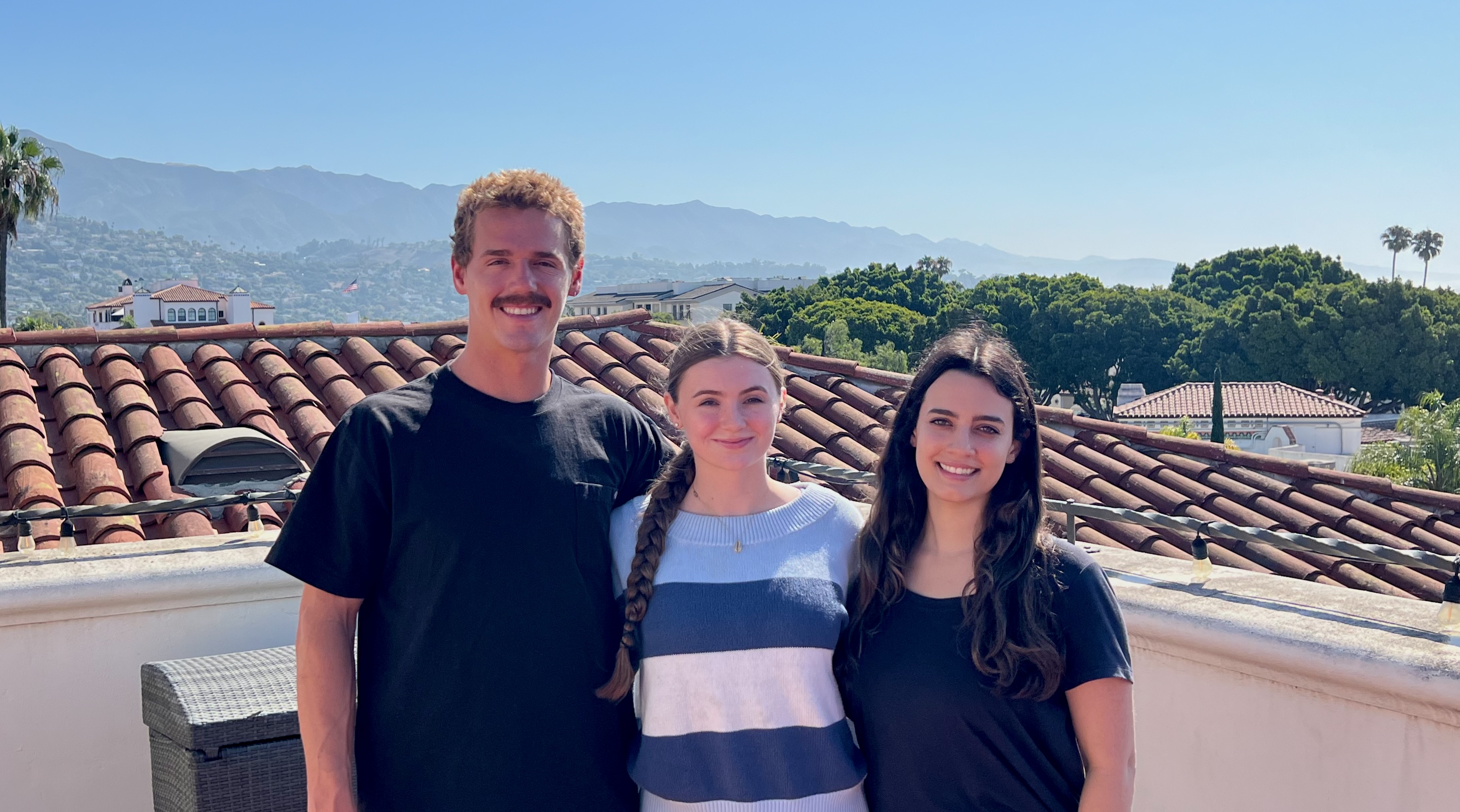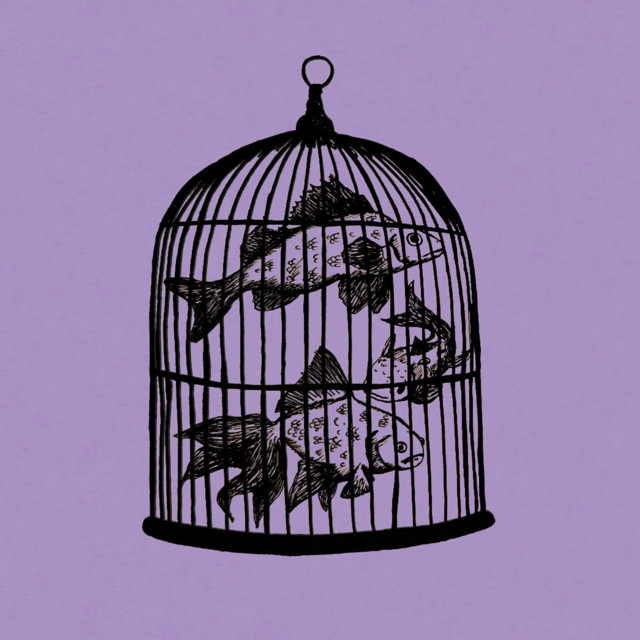Overview
Getting to know the 2024 Fellows
Wed, Jul 31, 2024
In 2024, the Ocean Health Index Global Fellows program has welcomed three fresh Data Science and Communication Fellows to its ranks. The selected trio all hail from the Bren School of Environmental Science & Management, with one Master of Environmental Data Science (MEDS) alumna and two current Master of Environmental Science and Management (MESM) students. This course is a collaborative effort between the Bren School of Environmental Science & Management and the National Center for Ecological Analysis and Synthesis (NCEAS).
In this blog post, we ask the incoming fellows questions to better understand their motivations while getting to know them.

Question 1
Where are you from?
Anna: I grew up in the Bay Area and have lived there for most of my life! I moved to Santa Barbara in 2023 for the Bren School’s Master of Environmental Data Science (MEDS) program.
Dustin: I grew up in an unincorporated community of El Cajon, California. Our catch phrase growing up was ‘Ten minutes away from being ten minutes away.’ Now having been in Santa Barbara since 2018, I’m just ten minutes away!
Sophia: I grew up in Los Angeles, and moved to Santa Barbara for my undergraduate degree in Aquatic Biology at UCSB. I worked locally for a year, then started my Master’s in Environmental Science and Management at the Bren School. I love SB so much, I never want to leave!
Question 2
What are some of your interests, personally and professionally?
Anna: Personally, I’m interested in tidepooling, identifying lichen, playing guitar and ukulele, cooking, gardening, reading, stand-up comedy, playing video and board games, and teaching myself random fun facts. Professionally, I am interested in using data visualization as a powerful tool for disseminating knowledge to and communicating with a wide range of audiences. I am grateful that I genuinely enjoy all of the data processing that needs to be done upstream in order to make those visualizations. Data wrangling and analysis problems feel like puzzles and I find it rewarding to work through different bugs and issues to get to solve those puzzles! I am also interested in a wide range of topics, including marine ecosystems, climate tech, and agroecology. I would like to make positive change in the world, and am passionate about applying data science to develop sustainable solutions.
Dustin: My personal interests are dominated by physical activity. My mom put my brother and I into soccer when we were very young, so we played seasonally until I started running for sport when I was eleven years old. I then joined the UCSB Triathlon team my first year of college for a 3-year stint. I now participate in all of the sports that any Santa Barbarian has dipped their toes in, although running still has my heart. I also enjoy reading primarily fiction or historical books, and working on cars. Professionally, I am predominantly interested in the dissemination of complicated information in a digestible manner to non-Academia, as well as the intersection between ocean conservation and private interests. I would like to bridge the gap between the different sects of stakeholders in ocean health to achieve sustainable utilization of marine resources while maintaining vital ecological benefits and processes.
Sophia: In my free time, I enjoy playing piano/guitar, long walks on the beach with my husband and dog, boogie boarding, practicing yoga, camping, and watching whatever new Star Wars content is out there. Professionally, my passion lies in the sustainable management of fisheries and sediment within our local watershed. I’m fascinated by local natural processes and their interaction with urbanization. An example of this is the impact of low-impact development strategies on the Santa Barbara watershed, instead of increasing the number of debris basins along local creeks. When debris basins are used, the sediment is deposited on Goleta beach, potentially impacting beach community structures and Steelhead population health. To learn more and read scientific papers on this topic, feel free to take a look at my Master’s Group Project working with Santa Barbara Channelkeeper, located here. I aim to use data-driven approaches to inform policies and enhance scientific understanding among the broader public. Ultimately, I hope to find innovative ways to support local communities while maximizing coastal and ocean ecosystem health.
Question 3
What drew you to the Ocean Health Index, and what are you excited to learn?
Anna: I heard about OHI from past fellows who I met at NCEAS during my time as a MEDS student. They all talked about how amazing the fellowship was, especially coming from the MEDS program (they were all also MEDS alumni). I was also captivated by how supportive and positive the working environment at NCEAS seemed to be. I grew up along the California coastline, which instilled in me a profound respect for the power and importance of our oceans, as well as the pressing need to monitor and improve ocean health on a global scale. I am excited to learn more about the data processing methodology for each data layer used to update the scores for the goals and subgoals.
Dustin: Having grown up in and around the ocean, as well as obtaining my B.S. in Aquatic Biology from UCSB, I have always maintained a deep respect for marine ecosystems and methods by which humans can sustainably interact with them. However, I found in my undergraduate career that information about aspects of such an interconnected system as the Oceans are generally disjointed and isolated to specific aspects. As a result, when I heard about NCEAS and the OHI Fellowship through professor Chris Jerde, I was excited by the idea of a project built around quantifying ocean health in a way that is both intuitive and globally representative. I’m looking forward to learning about the methodology supporting various metrics as well as participating in such a collaborative environment.
Sophia: As an undergraduate, I heard about NCEAS and their connection to UCSB by speaking to professors and TAs about my interests. I was drawn to the Global OHI Assessments, which takes a variety of abstract concepts (i.e. ocean health, sense of place, etc), and uses reproducible ways to quantify it using a variety of international sources. I remember loving the visualizations on their website, and kept the position in mind when I was looking for a summer internship before my second year of the MESM degree. The fellowship aligns with my goal to improve my data science skills, which are then applied to solution-oriented management practices within coastal resource management. I am so excited to learn the underlying processes within OHI and help produce a great open-source resource for a variety of audiences!
Question 4
What is something you have found interesting and want to recommend to others?
Anna: I would highly recommend the game Subnautica to anyone who’s looking for a new indie survival game with deeper storylines and underwater adventures. I also recently learned about a nitrogen-fixing organelle called a “nitroplast” which is considered to be the fourth known example of endosymbiosis!! You can read more about it in this Science Daily article about the Candidatus Tectiglobus diatomicola, this Berkeley Lab article and this UCSC article about the organelle and UCYN-A, and a Nature article on the topic.
Dustin: Something that I found surprisingly interesting was curating an insect collection for a class project. I naturally wasn’t expecting a riveting experience, but collecting 80 different morphospecies from 20 different families and 10 orders frankly changed the way I view the world. It was a pleasant exercise in patience as well as exciting to see the abundant variety of beautiful species that have found ways to persist in human-occupied environments. Plus it’s fun to tell your friends you’re going on a “Bug Hunt” (no live bees were caught during the curation of the collection).
Sophia: I recently came across a music group named Fish in a Birdcage. I love the way they combine cello motifs with an electric, folky sound. Plus, their album art is incredible! Here is my favorite:

I highly recommend the songs “Rule #4 – Fish in a Birdcage” and “Rule #1 – Magic”. They do a great job of using descriptive analogies in a unique way to convey distinct emotions.